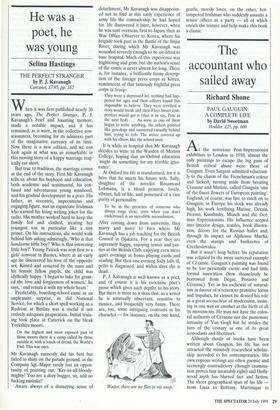He was a poet, he was young
Selina Hastings
THE PERFECT STRANGER by P. J. Kavanagh Carvanet, £7.95, pp. 182 When it was first published nearly 30 years ago, The Perfect Stranger, P. J. Kavanagh's brief and haunting memoir, made a notable impact, and it has remained, as it were, in the collective con- sciousness, becoming for its admirers part of the imaginative currency of its time. Now there is a new edition, and we can look again at what was so remarkable in this moving story of a happy marriage trag- ically cut short.
But true to tradition, the marriage comes at the end of the story. First Mr Kavanagh tells us about his boyhood and education, both academic and sentimental, his con- fused and adventurous young manhood, and his gradual development as a poet. His father, an eccentric, impecunious and engaging figure, was an expatriate Irishman who earned his living writing jokes for the radio. His mother worked hard to keep the family fed and clothed, treating her youngest son in particular like a tiny prince. On his instructions, she would walk behind him asking admiringly, 'Who is that handsome little boy? Who is that interesting little boy?' Young Patrick was sent first to a girls' convent in Barnes, where at an early age he discovered his love of the opposite sex. Kissed and cosseted by the nuns and his female fellow pupils, the child was idyllically happy. 'I began to take for grant- ed the love and forgiveness of women,' he says, ' and return it with my whole heart.'
Predictably, boarding-school came as an unpleasant surprise, as did National Service, for which a short spell working as a Redcoat at Butlins was a useful if not entirely adequate preparation. Initial train- ing took place at Catterick on the bleak Yorkshire moors.
On the highest and most exposed part of those moors there is a camp called by those outside it, with a touch of dread, the World's End. This was ours.
Mr Kavanagh earnestly did his best but failed to shine on the parade ground, as the Company Sgt.-Major rarely lost an oppor- tunity of pointing out. 'Ker-ist-all-bloody- mighty! You are a dozy bugger, sir, and no fucking mistake!'
Aware always of a dismaying sense of detachment, Mr Kavanagh was disappoint- ed not to find in this early experience of army life the comradeship he had hoped for. He discovered it later, however, when he was sent overseas, first to Japan, then as War Office Observer to Korea, where his brigade took part in the Battle of the Imjin River, during which Mr Kavanagh was wounded severely enough to be air-lifted to base hospital. Much of this experience was frightening and grim, but the author's sense of the comic is never absent for long. There is, for instance, a brilliantly funny descrip- tion of the foreign press corps in Korea, reminiscent of that famously frightful press corps in Scoop.
They were a depressed lot, nothing had hap- pened for ages and their editors found this impossible to believe. They were terrified a story would break and their Fleet Street com- petitors would get it (that is to say, Pete in the next bed) . . . As soon as one of them began to write anything, the others pointed like gun-dogs and sauntered casually behind him, trying to crib. The writer covered up with his elbow, like the school swot.
It is while in hospital that Mr Kavanagh decides to write to the Warden of Merton College, hoping that an Oxford education `might do something for my terrible igno- rance'.
At Oxford his life is transformed, for it is here that he meets his future wife. Sally, daughter of the novelist Rosamond Lehmann, is a blond princess, lovely, vibrant, full of life, and possessed of a rare purity of personality.
To be in the presence of someone who always rings clear, even when you don't understand, is an incredible astonishment.
After coming down from university, they marry and move to Java where Mr Kavanagh has a job teaching for the British Council in Djakarta. For a year they are supremely happy, enjoying tennis and par- ties at the British Club, enjoying even more quiet evenings at home playing cards and reading. But then one evening Sally falls ill, polio is diagnosed, and within days she is dead.
P. J. Kavanagh is well known as a poet, and of course it is his evocative poet's prose which gives such depths to his story. But there is more to it than that: as a writer he is unusually observant, sensitive to nuance, and frequently very funny. There are, too, some intriguing contrasts in his character — for instance, on the one hand, `Waiter, there are no flies in my soup.' gentle, moody lover, on the other, hot- tempered Irishman who suddenly assaults a senior officer at a party — all of which enrich the texture and help make this book a classic.


















































 Previous page
Previous page